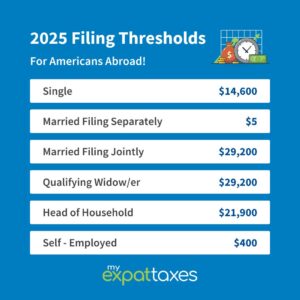A Complete Guide to Filing US Expat Taxes in Singapore
December 11, 2024 | Country Guides | 8 minute read
Expat Tax Blog. Tax Tips for US Americans abroad.
Updated January 20, 2025
 All blogs are verified by Enrolled Agents and CPAs
All blogs are verified by Enrolled Agents and CPAs
Updated January 20, 2025

Learning about taxes is a necessary task in every country, but it’s essential for US expats living abroad. As a US citizen in Singapore, you will be subject to two tax systems: one based on residency and the other based on citizenship. Making sure you stay informed about your US and Singapore tax responsibilities will help you avoid double taxation and stay tax-compliant. This guide will break down some essential information, from filing requirements and deadlines to key tax benefits for US expats.
Table of Contents
- Who Needs to File US Taxes?
- Filing US Taxes While Living in Singapore
- Understanding Visas in Singapore
- Tax Deadlines: US vs. Singapore
- Filing Singapore Taxes
- US Tax Benefits for Expats
- Family Benefits
- Self-Employment in Singapore
- Investing Abroad and Retirement
- First-Time Filing Abroad
- Getting Professional Help
Who Needs to File US Expat Taxes in Singapore?
If you’re a US citizen in Singapore, you will likely have to file US taxes or, at the very least, a Foreign Bank Account Report (FBAR) regardless of your whereabouts in the world. Even those of you who are Green Card holders will most likely need to report your worldwide income to the IRS annually. This obligation is still mandatory even if your income is entirely from Singapore or another foreign country.
If your filing threshold does not exceed the minimum, you could be exempt from US taxes as an American citizen or Green Card holder.

Filing US Expat Taxes While Living in Singapore
US taxes are one thing, but Singapore taxes as a US citizen is another. Singapore is similar in structure to many other countries in terms of residency status and income taxes.
To be considered a resident for tax purposes, you must reside in Singapore for 183 days or more. If you are a resident, you will face taxation between 0% and 24%, depending on your income level. Otherwise, you will be considered a non-resident, who is subject to a flat rate of 15% on any income earned within the country.
Foreign-sourced income, even income brought into Singapore, is generally exempt from Singaporean taxes unless your employment is directly tied to Singapore.
Visas for US Citizens in Singapore
If you’re already living in Singapore, you should know all about visa processes as an American. For those of you who don’t, here’s a small overview.
| Singapore Visas for Americans | |
|---|---|
| Singapore Employment Pass (EP) and Personalised Employment Pass | The Employment Pass is for professionals, managers, and executives who are from outside Singapore. Personalized Employment Pass is the same thing, but for high earners. |
| Singapore S-Pass | For a person who have been hired by a Singaporean company for a mid-level position |
| Singapore Dependent Pass (DP) | This is a pass for dependent(s) or spouse of someone who has an EP or S-Pass |
| Long-Term Visit Pass | This is for people with a step-parent, child, or common-law spouse with an Employment Pass or S-Pass |
| Singapore Investor Pass | Become a permanent residents through investing in the Singapore. Apply for Permanent Residence through the Global Investor Programme |
| Singapore Entrepreneur Pass (EntrePass) | Become an Entrepreneur in Singapore to receive this Pass. |
Your visa will affect your tax residency status because if you surpass the 183 mark, you will have different tax rates. This may influence the amount of income you report on your US expat taxes.
Key Deadline: US Taxes vs. Singapore Tax
When it comes to US taxes, you don’t have just one deadline to remember; you have four. Generally, you should file by April 15th, especially if you owe any taxes to the IRS – as they must be paid by this deadline. However, as a US expat, you get an automatic 2-month extension until June 15th. If this isn’t enough time, you can file Form 4868 to receive an extension until October 15th. Now, if you need time past October 15th, you can try to get the December 15th extension, but you must send a letter by mail to the IRS.
Singapore and US tax deadlines fit hand-in-hand as you must submit your tax return by April 15th of each year. Similar to the US, Singapore used a calendar-year tax system, which makes the process significantly easier for American expats. Another plus to Singaporean taxes is that there is not capital gains tax in Singapore – perfect for reporting investment income.
Filing Singapore Taxes as a US Expat
E-filing is highly encouraged in Singapore. You can file your Singapore taxes using the online Inland Revenue Authority of Singapore (IRAS) e-Services portal. This allows you to submit your tax return quickly and easily. Here’s how you do it:
First, you need your Singpass Foreign user account (SFA), which allows you to log in to the online e-filing portal.
When you have your SFA, it is good to ensure you have some necessary documents, such as:
- Form IR8A, which is the “Reporting Employee Earnings” and is usually submitted by your employer
- Particulars of your dependants (e.g., child, parent) for new relief claims
- Details of rental income from your property (e.g., gross rent, expense claims) and other income
- Business registration number/partnership tax reference number (for self-employed and partners only).
Once you log in, you will need to click on “individuals” followed by “file income tax return.” Afterward, you will wait for the tax forms to load, and then you will need to walk through the software, answering and filling out any questions that pertain to you.
Finally, when you feel confident, you can submit your Singapore taxes by hitting “submit.” You should receive a notice that your tax return has been filed. If you have filed incorrectly, there will be a request to re-file within 7 days of your prior submission.
Late Fees
It is important to note that if you file your Singapore taxes after April 15th, you will be penalized. If you cannot afford to pay this penalty all at once, you can apply for the GIRO 12-month installment plan. This plan must be approved one month in advance, meaning each month you wait, there will be an initial 5% penalty on any unpaid taxes, plus 1% for every additional month (maxing at 12% in total).
Therefore, if there is any chance that your owed taxes will not be paid before April 15th, begin to set up an installment plan to avoid any penalties. You can do this by logging into the e-filing portal, Singapore internet banking, or AMX stations.
US Tax Benefits for Expats in Singapore

There’s always that worry that you will have to get double taxed when you are filing US taxes and foreign taxes. Fortunately, there are a few options for US expats to help mitigate that risk.
The first one is the Foreign Earned Income Exclusion (FEIE). The FEIE allows you to exclude $126,500 of foreign earned income from your US tax return. In order to qualify, you will need to pass the Physical Presence Test or the Bona Fide Residence Test.
The second option is the Foreign Tax Credit (FTC), which allows you to reduce your US tax liability with the foreign taxes you’ve already paid to Singapore.
If you’re wondering about a US and Singapore tax treaty, there is no such thing as one, but these tax benefits can help you avoid double taxation.
Family Benefits for US Citizens in Singapore
If you and your family live together in Singapore, you could still benefit from the Child Tax Credit (CTC). You could claim up to $2,000 per qualifying child under 17 that has a US social security number. What makes this benefit even better is the refundable portion which is equal to around $1,700.
If you and your family are missing the comforts of the US, check out events that are happening with the American Association in Singapore.
US Self-Employment in Singapore
Whether you’re interested in being an entrepreneur or you are, being aware of self-employment taxes for US expats will save you a future headache. When you’re working abroad as a self-employed individual, you should save around 15.3% to cover US self-employment taxes. This payment will contribute to your Social Security and Medicare. If your company is earning less than $400, you are exempt from filing self-employment taxes. However, if your net income is over $400, you will need to file.
US taxes are just one point, you also need to consider Singapore taxes. Singapore does not have any specific self-employment tax, but you will still need to report your income to the Inland Revenue Authority of Singapore. When you file Singaporean taxes, you can use the FTC, to offset the your US taxes liability.
Two taxations does not mean double taxation.
Retiring and Investing for US Expats in Singapore
Retiring and investing go hand in hand with being a US citizen in Singapore. There are several options for US citizens to invest in for their future. The most common are Individual Retirement Accounts (IRAs), which also come with a wide selection. The only limiting factor about IRAs is that you can only contribute $7,000 maximum per year, which might not be enough for the average earner. Contributing to a Roth or traditional IRA does require you to have taxable income on your US tax return, so you’ll need to plan accordingly.
First-Time Filing Abroad
If it’s your first year in Singapore and you’re just trying to figure out how to file from abroad, it’s recommended that you use US expat tax software to make the process easier. However, if you realize after many years that you have had to file US taxes but didn’t know, you will likely have to use the Streamlined Procedure.
The Streamlined Procedure allows US expats to catch up on up to three past US tax returns and up to six FBARs, all penalty-free. This procedure is available to those who haven’t filed since moving abroad and who have not been contacted by the IRS regarding unfiled taxes.
Simplify Your US Expat Taxes in Singapore
Having two tax returns may seem overwhelming for a US expat living in Singapore, but it doesn’t have to be. You can use the MyExpatTaxes software, which simplifies the process for you. Most of our customers finish their US taxes in under 30 minutes! Let us help to maximize your US tax benefits and ensure your return is filed correctly!

Written by Nathalie Goldstein, EA
Nathalie Goldstein, EA is a leading expert on US taxes for Americans living abroad and CEO and Co-Founder of MyExpatTaxes. She contributes to Forbes and has been featured in Forbes, CNBC and Yahoo Finance discussing US expat tax.
December 11, 2024 | Country Guides | 8 minute read










